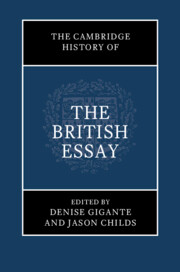Book contents
- The Cambridge History of the British Essay
- The Cambridge History of the British Essay
- Copyright page
- Contents
- Illustrations
- Contributors
- Acknowledgements
- Preface to a History in the Manner of an Essay
- Part I Forming the British Essay
- Part II The Great Age of the British Essay
- 10 Essayistic Personae and Personhood
- 11 Clubs and Coffeehouses: Sociability and the Essay
- 12 Loose Sallies of the Mind: Distraction and the Essay
- 13 The Essay and the Rise of the Novel
- 14 The Periodical Essay and the Rise of Literary Professionalism
- 15 On Books: The Bibliographical Essay
- 16 Satire and the Essay
- 17 Food and the Essay
- 18 Forms of Thought: Dreams, Reverie, and the Essay
- 19 The Urban Familiar Essay of the Romantic Era
- Part III Assaying Culture, Education, Reform
- Part IV Fractured Selves, Fragmented Worlds
- Part V The Essay and the Essayistic Today
- Book part
- Bibliography
- Index
16 - Satire and the Essay
from Part II - The Great Age of the British Essay
Published online by Cambridge University Press: 31 October 2024
- The Cambridge History of the British Essay
- The Cambridge History of the British Essay
- Copyright page
- Contents
- Illustrations
- Contributors
- Acknowledgements
- Preface to a History in the Manner of an Essay
- Part I Forming the British Essay
- Part II The Great Age of the British Essay
- 10 Essayistic Personae and Personhood
- 11 Clubs and Coffeehouses: Sociability and the Essay
- 12 Loose Sallies of the Mind: Distraction and the Essay
- 13 The Essay and the Rise of the Novel
- 14 The Periodical Essay and the Rise of Literary Professionalism
- 15 On Books: The Bibliographical Essay
- 16 Satire and the Essay
- 17 Food and the Essay
- 18 Forms of Thought: Dreams, Reverie, and the Essay
- 19 The Urban Familiar Essay of the Romantic Era
- Part III Assaying Culture, Education, Reform
- Part IV Fractured Selves, Fragmented Worlds
- Part V The Essay and the Essayistic Today
- Book part
- Bibliography
- Index
Summary
This chapter examines the irony, complexity, and pleasure in rhetorical ingenuity evident in the satirical essay in English, taking as its central exemplars some of the key historical figures in that tradition in the eighteenth and early nineteenth centuries, from the Irish authors Jonathan Swift and Maria and Richard Lovell Edgeworth through to the Romantic essayists Charles Lamb, Thomas De Quincey, and Thomas Love Peacock. It demonstrates how the prose essay became a powerful satirical form in the Georgian period, and discusses the tonal richness and ambiguity which render the satirical essay a key subgenre in the tradition of the prose essay in English. It pays particular attention to the links between satire, colonialism, the Gothic, and the sublime in the form of the essay.
Keywords
- Type
- Chapter
- Information
- The Cambridge History of the British Essay , pp. 231 - 245Publisher: Cambridge University PressPrint publication year: 2024

